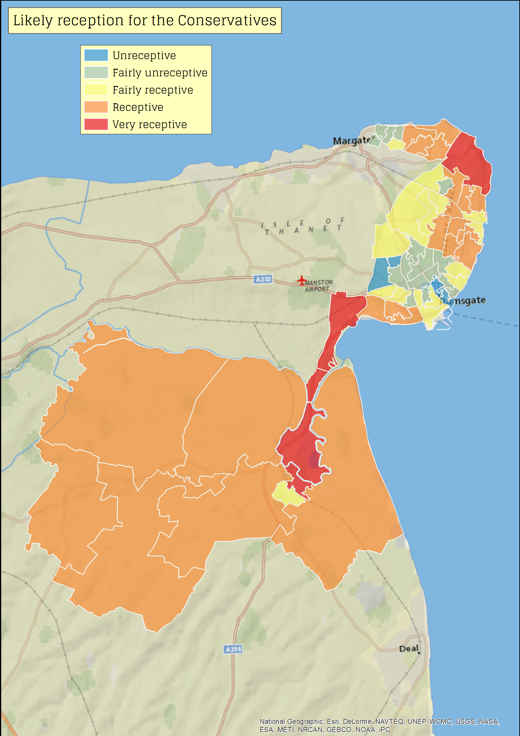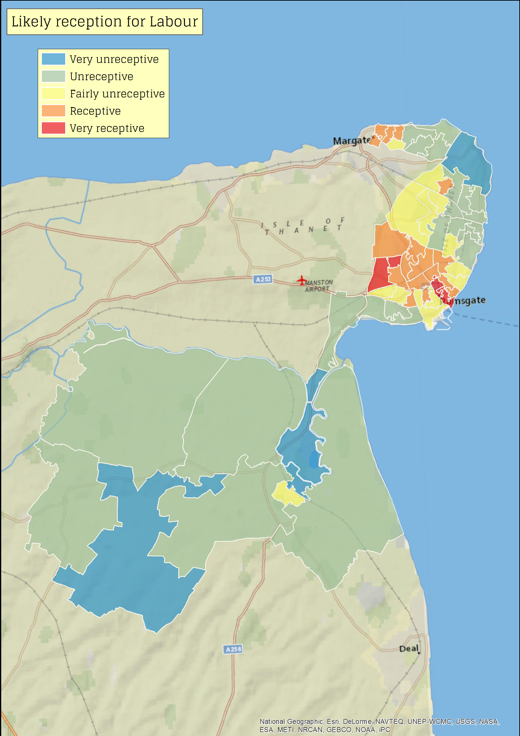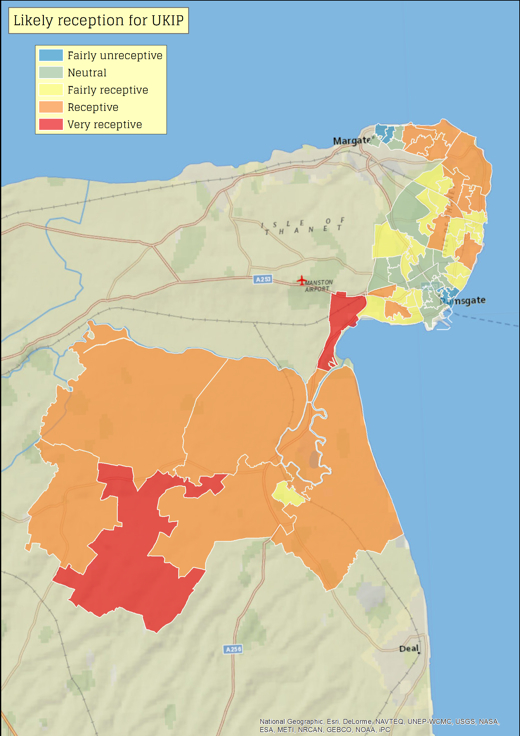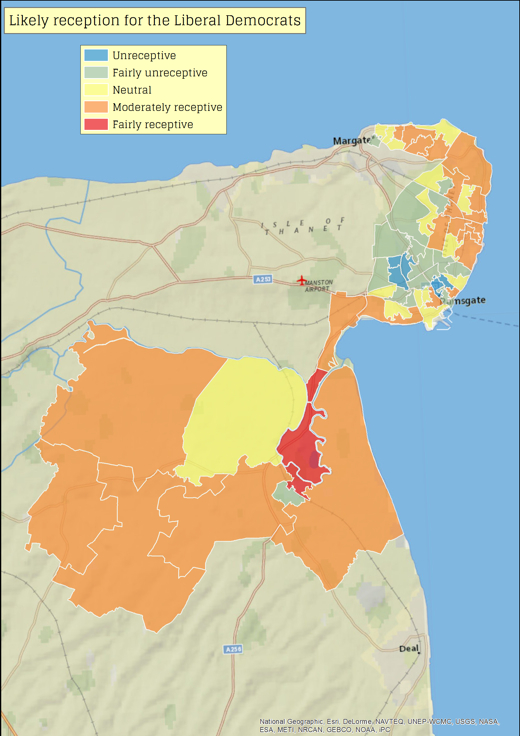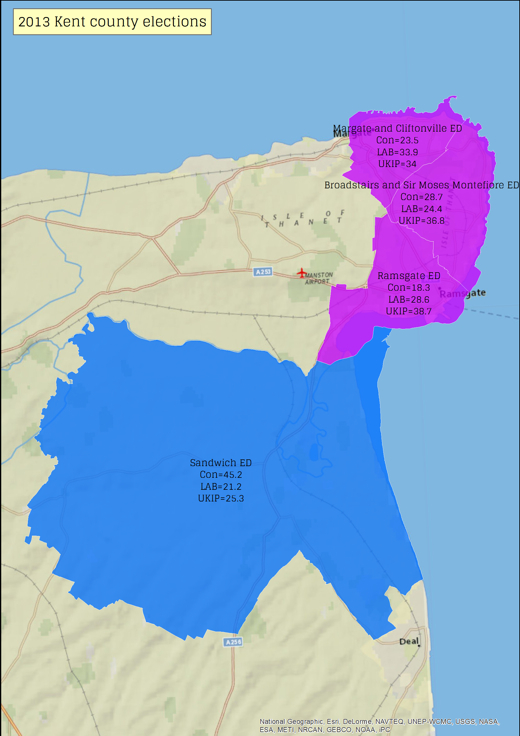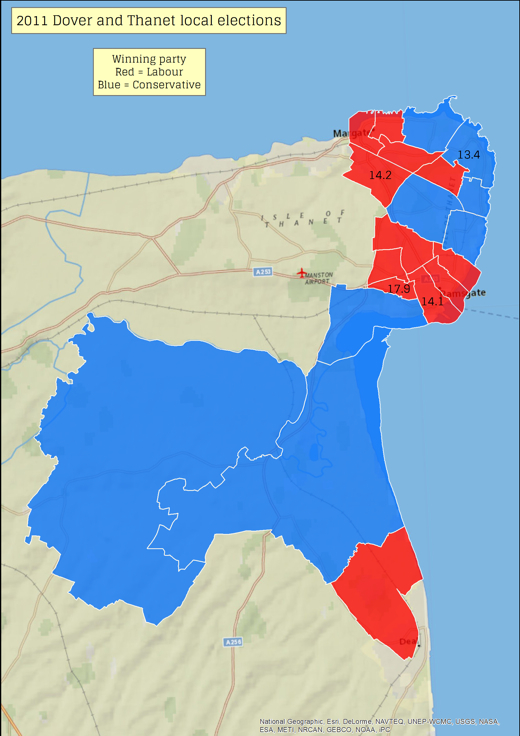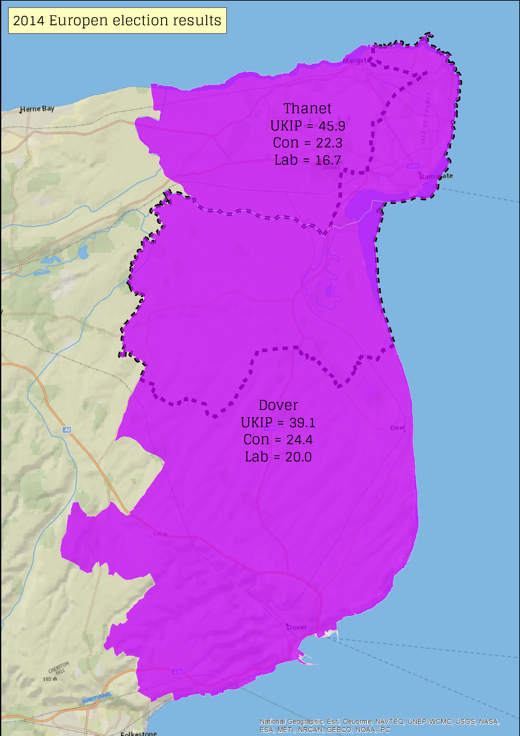Will he or won’t he stand in Thanet South? Nigel Farage’s name has been circulating in connection with this constituency for months, after the sitting Tory MP Laura Sandys announced she was standing down. But it’s all grown a whole lot more complicated in the past few days because a former Ukip member, Craig Mackinlay, has been selected to stand for the Conservatives. Now, the Ukip leader must decide whether standing against a former comrade will weaken his appeal in the seat.
But how strong is that appeal anyway? The following data allows the households within Thanet South constituency to be segmented into 69 distinct demographic groups, and the chart below shows the demographic profile of Thanet South. The coloured bars represent the proportion of households from each demographic group in Thanet South. The hollow black bars represent the proportion of households from each demographic group in England Wales.
Click to expand
Here are the descriptions of these groups, together with the proportion of households in the seat, and their likely voting behaviour and turnout record.
- A4 Villagers with few well-paid alternatives to agricultural employment (2.06% of households; most likely Conservative, but some UKIP support; good turnout)
- B5 Better-off empty nesters in low density estates on town fringes (5.13%; most likely Con, some UKIP; very good turnout)
- B6 Self-employed trades people living in smaller communities (3.54%; equal Con/UKIP split; good turnout)
- B7 Empty nester owner occupiers making little use of public services (4.22%; equal Con/UKIP split; good turnout)
- B8 Mixed communities with many single people in the centres of small towns (5.34%; most likely Con, some UKIP or LD; good turnout)
- D15 Well-off commuters living in spacious houses in semi-rural settings (2.1%; most likely Con or LD; excellent turnout)
- G33 Transient singles, poorly supported by family and neighbours (5.6%; most likely Labour; poor turnout)
- I43 Older town centres terraces with transient, single populations (3.8%; most likely Labour, but more recently UKIP; poor turnout)
- I44 Low income families occupying poor quality older terraces (2.99%; most likely Labour, more recently UKIP; poor turnout)
- J45 Low income communities reliant on low skill industrial jobs (4.67%; most likely Labour, more recently UKIP; poor turnout)
- J46 Residents in blue collar communities revitalised by commuters (3.77%; most likely Con, some UKIP or LD; good turnout)
- K48 Middle-aged couples and families in right-to-buy homes (3.04%; most likely Labour, more recently some UKIP; poor turnout)
- L52 Communities of wealthy older people living in large seaside houses (4.39%; most likely Con, some UKIP; good turnout)
- L54 Retired people of modest means commonly living in seaside bungalows (4.99%; equal split Con/UKIP; good turnout)
- L55 Capable older people leasing / owning flats in purpose built blocks (1.79%; equal split Con/LD; good turnout)
- M56 Older people living on social housing estates with limited budgets (3.77; UKIP then Labour; poor turnout)
- M57 Old people in flats subsisting on welfare payments (2.14%; Labour; very poor turnout)
- M58 Less mobile older people requiring a degree of care (1.62%; LD or Con; good turnout)
- M59 People living in social accommodation designed for older people (1.66%; Labour; poor turnout)
- N60 Tenants in social housing flats on estates at risk of serious social problems (1.19%; Labour; poor turnout)
- N61 Childless tenants in social housing flats with modest social needs (2.89%; most likely Labour; very poor turnout)
- O68 Families with varied structures living on low rise social housing estates (2.62%; Labour or UKIP; poor turnout)
One important factor in Thanet South, and perhaps a key reason why Farage may choose the seat, is that there are fewer younger households than would be expected nationally and almost no student households. Younger voters and students are not convinced by UKIPs narrow focus on immigration and Europe or their conservative social views. A lack of younger voters increases the median age of residents in Thanet South, which Farage and the Conservatives would welcome. Thanet South is also a constituency with small proportions of ethnic minority residents, again a demographic with which UKIP has struggled to find support. Finally the poorer demographic groups (N62 to O69, with the exception of O68) are not strongly represented in the constituency; groups which lean towards Labour. The combination of these factors mean the constituency plays very well for both the Conservatives and UKIP, and not so well for either the Liberal Democrats or Labour.
Using the voting behaviour of each of the demographic groups, it is possible to portray the political ‘balance’ of areas within Thanet South. Balance measures simply reflect the sum of all the demographic groups’ voting behaviour in particular areas. For example, if an area contained 100% poor households the balance would clearly be tilted towards Labour, based on previous voting behaviour. Where the demographic composition is balanced more equally between groups the likely reception for any particular party is less definitive. The maps below show the likely reception for each of the four main parties in Thanet South, based on the demographic composition of neighbourhoods and their prior voting behaviour (in the 2005 and 2010 general elections and the 2012 and 2014 local elections).
These maps display the relative political leanings of particular areas within Thanet South. Although the UKIP and Conservative maps may seem similar there are some subtle but noticeable differences. For instance UKIP can expect a slightly better reception than the Conservatives in the areas around Ramsgate and Margate. Where the reception for UKIP in these areas is broadly neutral, for the Conservatives these areas are likely to be fairly unreceptive to their charms. Why? Because these areas are home to lower income families or transient singles in terraced houses (I43s and I44s in the list above) that vote Labour but have also more recently been attracted to UKIP. These groups will most certainly not be voting Conservative.
How have the voters of Thanet South behaved in the recent past? The following map shows the results of the 2013 Kent county elections in the constituency. The winning party is shaded (blue = Con, purple = UKIP) and the percentage vote share is shown on the map for the Conservatives, UKIP and Labour.
UKIP performed extremely well in the 2013 elections as the map shows. Farage has always stated he would only stand in a seat where the party has an established local presence in terms of councillors and vote share. This condition has been met in Thanet South.
In the 2011 Thanet and Dover local elections UKIP only stood in four of the twenty wards in Thanet South where elections were held, so the results are not as indicative as 2013 in terms of how UKIP performed.
The vote tallies from the recent European elections in Dover and Thanet are also worth considering. While these elections are low in turnout and not that reliable as a measure of general election vote intention the results for UKIP are again strong. The map below shows the results for the two counting areas of Dover and Thanet, together with the boundaries of the Thanet South constituency (dotted line):
Taken together the above results point to some electoral strength for UKIP in the constituency. Council and European election successes embolden the local party and help with recruitment drives. They also further legitimise the party in the eyes of voters and Farage will be hoping to point to the competence of newly-elected councillors as exemplars of UKIP in office.
Finally, there are the results of the last four general elections to consider. It is important to understand that the boundaries of the constituency were changed for the 2010 general election. However the record of the three main parties in recent general elections has been mixed.
Labour has seen their vote share fall from 46% in 1997 to 31% in 2010, a loss of over 6,000 votes. However there are reasons to be cautiously optimistic for Labour in the seat. The party has consistently punched above its weight in the constituency when compared to the rest of the south-east, a region where Labour has struggled to break 30% since 1997. The party suffered vote share losses between 2005 and 2010 but broadly in line with the national and regional swings, and the party will hope their uptick in vote intention polling since 2010 will be reflected in an improved performance in the seat. If Farage runs as a candidate, it may open a path for Labour to regain the seat in a tight three-way contest. This provides a quandary for Labour HQ; if they go hard after UKIP they risk handing seats like Thanet South to the Conservatives. Go easy and UKIP begins to stake a claim as the party of opposition in the Labour heartlands.
For the Conservatives the seat should present good ground. The demographics are good, turnout amongst their groups here is strong. However their sitting MP, Laura Sandys, has already announced her intention to step down in 2015 and at the time of writing the party has yet to announce a candidate. Since 1997 the party has seen its vote share rise from 40% to 48%, broadly in line with the momentum in voting intention polling over that time. It remains to be seen how the deflation in Conservative poll numbers will be reflected in 2015 but the worry must be that UKIP will eat further into their base. The Conservatives have little choice but to adopt a firebreak strategy, using negative campaign tactics to separate the burning fires of the right-wing of the party with the relative calm of the centre ground.
For UKIP the strategy will be to sneak out a close win in a three-way race between themselves, Labour and the Conservatives. The party needs to draw votes from both parties. However this is a strategy that has thus far only resulted in respectable seconds in by-elections up and down the country. There is a limit to how far this approach can take the party, and the strategy has a natural ceiling. This could be why Farage may choose to concentrate on seats where lower vote shares could win the seat. Polling of the constituency carried out by Survation has shown that UKIP are in second behind Labour (35%) at 30% with the Conservatives on 28% – and this was long before any suggestion that Farage might stand there.
One fascinating aspect of UKIPs rise has been how it has destroyed the neatly arranged strategies of both Labour and the Conservatives. Across the country UKIP presents first- and second-order impacts for the main parties. In some seats UKIP vote share will likely determine the winner although the party will have little chance of winning. In other seats they represent a genuine challenge for the seat in tight three-way marginals. It remains to be seen whether the possible involvement of Farage means Thanet South is an example of the former or the latter. One thing’s for sure; the hostelries of Ramsgate and Margate can expect a bumper May 2015.
Tags: Laura Sandys, Nigel Farage, Thanet South, UKIP



